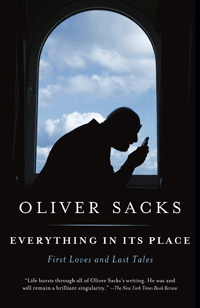 Oliver Sacks, Everything In Its Place: First Loves and Last Tales (New York: Knopf, 2019), 274pp.
Oliver Sacks, Everything In Its Place: First Loves and Last Tales (New York: Knopf, 2019), 274pp.
A few months before he died, the British neurologist Oliver Sacks (1933–2015) published his memoir On the Move. Soon after he died in August of 2015, there came a little volume (45 pages) called Gratitude (2016) that consisted of four "chapters" that originated as essays in the New York Times. Now comes this posthumous collection of thirty-three essays, most of which were previously published from 1987 to 2015, and seven of which were heretofore unpublished. Readers who are familiar with Sacks' fifteen previous books will appreciate his trademark style that caused the New York Times to call him "the poet laureate of medicine" — a marvelous mix of history, medicine, science, personal experiences, and anecdotes based upon his clinical cases.
The essays are divided into three sections. "First Loves" are essays of a personal nature, like Sack's addiction to swimming that he inherited from his father, his love of museums (where he discovered the periodic table at the age of ten), and the family library (where he learned to read when he was three or four). Sacks the brilliant polymath emerges at an early age. The second section contains "Clinical Tales." Sacks was especially interested in neurological conditions that he found "illuminating in their excess," like out of body experiences, near death experiences, hiccups cured by hypnosis, Tourette's Syndrome, madness, mania, mental illnesses, and dementia. These were cases that fired his scientific curiosity and radical human empathy. As Brad Keister observed in his JWJ review of On the Move, Sacks "went beyond a view of the mind that had only two states — functioning or failing — to the perspective that our varied neurological makeups speak to the very core of who we are. In so doing, he challenged our notions of what constitutes normal or right about others and about ourselves." In the third section called "Life Continues," there's a potpourri of essays on everything from extraterrestrial life to whether elephants really do run.
I love reading Sacks. My only complaint about this book is that there is no introduction or afterword whatsoever. It's not clear who gathered this particular collection of essays, why, and what the selection criteria were, nor any brief essay that could have given an overview of the life and work of a colorful scientist who was fascinated about what makes us fully and truly human.
Dan Clendenin: dan@journeywithjesus.net


